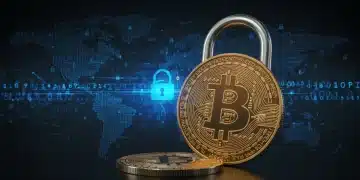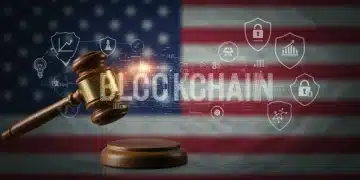Bipartisan accord on data encryption passed amid controversies

The bipartisan accord on data encryption is a legislative agreement designed to enhance data security, address privacy concerns, and adapt to evolving technological threats.
Bipartisan accord on data encryption passed recently, shaking up the tech landscape. With debates about privacy and security escalating, what changes can we expect? Let’s delve into the details that matter.
Understanding data encryption: The basics
Understanding data encryption is crucial in today’s digital world. This process helps protect sensitive information by converting it into a code. Only those with the correct key can access the original data, enhancing security significantly.
What is Data Encryption?
Data encryption involves using algorithms to secure information. Essentially, it takes readable data and transforms it into an unreadable format. This ensures that even if someone intercepts the data, they won’t understand it without the necessary decryption key.
Types of Data Encryption
There are several types of data encryption, each with its purpose:
- Symmetric encryption: Uses a single key for both encryption and decryption.
- Asymmetric encryption: Utilizes a pair of keys – a public and a private key.
- Hash functions: Converts data into a fixed-size string of characters, which is unique to the original data.
The choice between these types depends on the specific needs and security requirements.
Why is Data Encryption Important?
Data encryption plays a crucial role in safeguarding personal information and maintaining privacy. As cyber threats increase, individuals and organizations must prioritize encryption to protect against data breaches.
For instance, financial institutions utilize strong encryption methods to shield customer transactions. This level of protection builds trust and ensures sensitive information remains confidential.
Moreover, with the rise of remote working, the demand for secure data transmission has surged. Encryption ensures that data shared over the internet stays protected, minimizing risks associated with online communication.
Thus, understanding the basics of data encryption empowers users to make informed decisions regarding their digital security.
The implications of the bipartisan accord
The implications of the bipartisan accord on data encryption are far-reaching. This agreement signifies not only a step toward better security standards but also a shift in how data privacy is viewed in the digital age.
Enhanced Security Standards
This accord aims to establish stronger encryption practices. The new regulations will compel organizations to adopt more rigorous security measures. This is essential in a time when data breaches are rampant. Encrypting data will help protect sensitive information from unauthorized access and cyber threats.
- Protection of Personal Information: With stronger regulations, individuals can feel safer sharing personal data online.
- Corporate Responsibility: Companies will be held accountable to maintain high security standards.
- Trust Building: Enhanced security measures will build trust between consumers and businesses.
Moreover, this bipartisan agreement affects different sectors differently. For instance, technology companies may need to invest more resources in complying with new laws.
Impact on Privacy Laws
The bipartisan accord could also influence existing privacy laws. As encryption becomes a standard practice, lawmakers might reevaluate current privacy frameworks. This shift could result in more stringent laws regarding how data is handled, shared, and protected.
A clear example is how financial institutions are already implementing tighter security measures in response to growing demands for data protection. As companies enhance their encryption methods, users will likely demand even greater transparency about how their data is used.
In this evolving landscape, businesses must adapt to ensure compliance with emerging regulations. The implications of this accord will be significant, shaping not just technology but also how society approaches data privacy.
Key players in the negotiation process

Understanding the key players in the negotiation process of the bipartisan accord on data encryption helps to grasp how this agreement came to be. Various stakeholders play critical roles, each bringing unique perspectives and interests to the table.
Government Officials
Government officials are pivotal in shaping the framework of the accord. Lawmakers from both sides of the aisle collaborate to create a balanced approach to data security and privacy. Their negotiations ensure that the concerns of constituents are addressed while also accommodating technological progress.
Technology Companies
Tech companies are essential players; they are often at the forefront of encryption technology. Organizations like Google, Microsoft, and smaller startups provide input on what is feasible and what measures are necessary to protect user data effectively. The insights from these companies can help legislators craft practical and impactful rules.
- Compliance needs: Companies highlight the need for regulations that are realistic for their operations.
- Innovation impact: The impact on ongoing technological advancements is frequently discussed.
- Consumer trust: They stress the importance of maintaining consumer trust through reliable security practices.
Industry associations also represent the collective voice of various tech companies, helping to streamline discussions and present unified positions.
Civil Liberties Organizations
Another crucial group is civil liberties organizations, which advocate for individual rights and privacy. These groups ensure that any new regulation does not infringe on personal freedoms. Their involvement is vital to maintain a balance between security and civil liberties.
Moreover, they often engage in public campaigns to inform citizens about proposed changes and advocate for transparency in the encryption process. Through various channels, these organizations raise awareness about the importance of data privacy and push for regulations that protect consumer rights.
Finally, public opinion also influences negotiations. As more people become aware of data security issues, their voices shape the conversations among lawmakers and industry leaders. Understanding these key players gives a clearer picture of how the bipartisan accord on data encryption evolves.
Public reactions to the encryption legislation
Public reactions to the encryption legislation are varied and often reflect deep concerns about privacy and security. As the bipartisan accord on data encryption gains attention, many citizens are evaluating how these changes will impact their daily lives.
General Public Sentiment
Many members of the public express a sense of cautious optimism about stronger data protection measures. They appreciate that the legislation aims to secure personal information better. However, some fear that increased regulation might lead to overreach by government agencies.
Concerns about the potential misuse of data and violations of privacy rights frequently surface in discussions. Many advocates argue that while encryption can enhance security, it should not compromise individual freedoms. This perspective emphasizes the importance of maintaining personal privacy even amid heightened security measures.
Voices of Advocacy Groups
Civil liberties organizations play a key role in shaping public opinion. They often hold campaigns to raise awareness of the potential impacts of the legislation. These groups stress the need for transparency in how data is collected and used.
- Public Awareness: They encourage citizens to stay informed about their rights regarding data privacy.
- Engagement: Advocacy groups often urge the public to engage with lawmakers to express their concerns.
- Transparency: They emphasize that any encryption legislation should include provisions for oversight and accountability.
This engagement often leads to public forums and discussions, where individuals share their thoughts and concerns. The contribution of these voices helps to ensure that the legislation aligns with public interests.
Impact on Businesses
Businesses are equally invested in the encryption legislation, as public trust is vital for their operations. Many companies view the accord as an opportunity to enhance their security measures, but there is also anxiety about compliance costs.
As customers become more aware of data security, their expectations increase. Companies understand that demonstrating a commitment to encryption can foster consumer loyalty. However, they must also balance these improvements with the realities of operational costs.
The public reaction to the encryption legislation illustrates a complex interplay of support and concern. This dialogue will continue to evolve as regulations take shape and their implications unfold.
Future challenges in data security
Future challenges in data security are rapidly evolving as technology advances. As the bipartisan accord on data encryption takes effect, organizations must prepare for new hurdles in ensuring data safety.
Adapting to Emerging Threats
Cybersecurity threats are becoming more sophisticated, and hackers constantly find new methods to breach systems. Organizations need to stay ahead of these threats by continuously updating their security protocols. This includes investing in the latest encryption technologies and training employees on security best practices.
Alongside traditional hacking methods, new challenges such as ransomware attacks are also on the rise. These attacks often lock access to critical data until a ransom is paid, endangering businesses and individuals.
- Investing in AI Security Tools: Utilizing artificial intelligence can help identify potential threats before they cause harm.
- Regular Security Audits: Conducting audits can reveal vulnerabilities that need to be addressed.
- Training Employees: Regular training helps create a culture of security within the organization.
Privacy Regulations Compliance
As legislation surrounding data privacy evolves, businesses must ensure compliance to avoid hefty fines. The new encryption laws demand complete transparency about how data is collected, used, and safeguarded, which can be challenging for existing frameworks.
Organizations will need to dedicate resources to compliance efforts, which may involve updating policies and procedures, hiring compliance officers, and conducting training sessions for employees on new regulations. Meanwhile, consumer expectations regarding data privacy continue to grow, adding additional pressure on companies to clarify their practices.
Balancing Security and Accessibility
Another significant challenge is striking a balance between security and accessibility. While data encryption enhances security, it can also complicate access for legitimate users. Organizations must ensure that their security measures do not hinder productivity.
Simplifying access while maintaining robust security measures is essential for operational efficiency. Companies may need to implement user-friendly authentication methods that do not compromise security standards.
In summary, the future of data security involves navigating a complex landscape of evolving threats and regulations. As businesses adapt, the interplay between security, compliance, and accessibility will shape how data is managed.
FAQ – Frequently Asked Questions about Data Encryption and Security
What is the bipartisan accord on data encryption?
The bipartisan accord on data encryption is a legislative agreement aimed at enhancing data security while balancing privacy rights.
Why is data encryption important?
Data encryption is crucial as it protects sensitive information from unauthorized access, ensuring the privacy and security of personal and business data.
What challenges do organizations face with data security?
Organizations face challenges such as evolving cyber threats, compliance with new regulations, and the need to balance security with user accessibility.
How can individuals contribute to data security?
Individuals can enhance data security by staying informed about privacy practices, using strong passwords, and advocating for transparent data policies.





